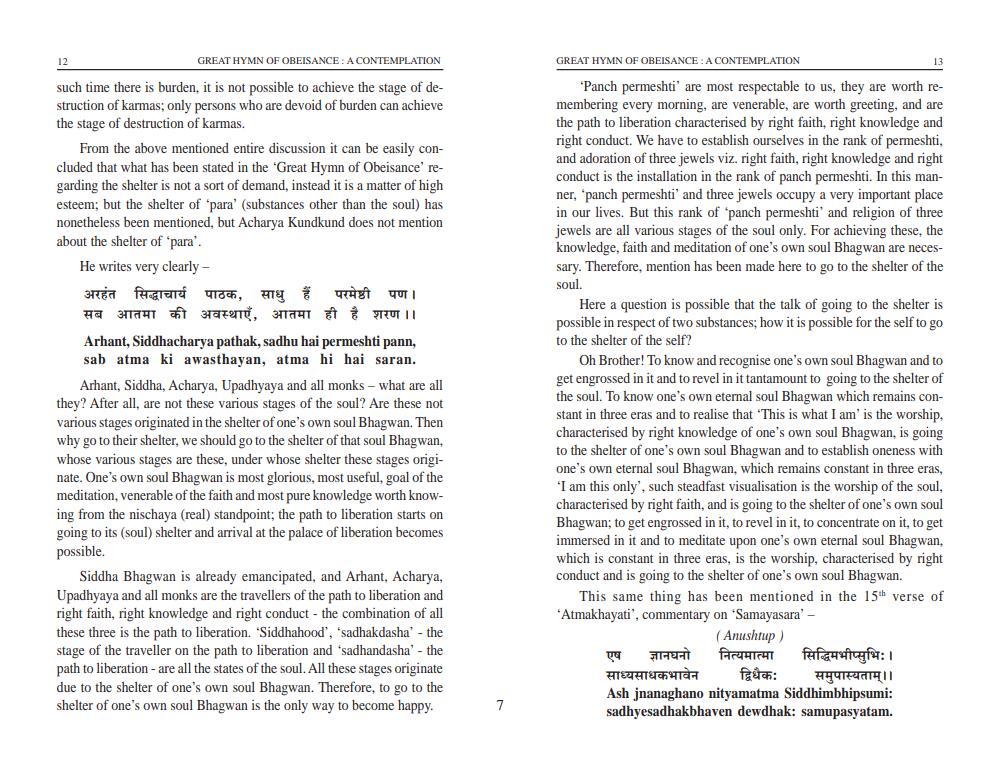Book Title: Namokar Mahamantra Ek Anushilan Author(s): Hukamchand Bharilla Publisher: Todarmal Granthamala Jaipur View full book textPage 8
________________ GREAT HYMN OF OBEISANCE: A CONTEMPLATION GREAT HYMN OF OBEISANCE: A CONTEMPLATION 13 such time there is burden, it is not possible to achieve the stage of destruction of karmas; only persons who are devoid of burden can achieve the stage of destruction of karmas. From the above mentioned entire discussion it can be easily concluded that what has been stated in the 'Great Hymn of Obeisance regarding the shelter is not a sort of demand, instead it is a matter of high esteem; but the shelter of 'para' (substances other than the soul) has nonetheless been mentioned, but Acharya Kundkund does not mention about the shelter of 'para'. He writes very clearly - अरहंत सिद्धाचार्य पाठक, साधु हैं परमेष्ठी पण । सब आतमा की अवस्थाएँ, आतमा ही है शरण ।। Arhant, Siddhacharya pathak, sadhu hai permeshti pann, sab atma ki awasthayan, atma hi hai saran. Arhant, Siddha, Acharya, Upadhyaya and all monks - what are all they? After all, are not these various stages of the soul? Are these not various stages originated in the shelter of one's own soul Bhagwan. Then why go to their shelter, we should go to the shelter of that soul Bhagwan, whose various stages are these, under whose shelter these stages originate. One's own soul Bhagwan is most glorious, most useful. goal of the meditation, venerable of the faith and most pure knowledge worth knowing from the nischaya (real) standpoint; the path to liberation starts on going to its (soul) shelter and arrival at the palace of liberation becomes possible. Siddha Bhagwan is already emancipated, and Arhant, Acharya, Upadhyaya and all monks are the travellers of the path to liberation and right faith, right knowledge and right conduct - the combination of all these three is the path to liberation. Siddhahood', 'sadhakdasha' - the stage of the traveller on the path to liberation and sadhandasha' - the path to liberation - are all the states of the soul. All these stages originate due to the shelter of one's own soul Bhagwan. Therefore, to go to the shelter of one's own soul Bhagwan is the only way to become happy. "Panch permeshti' are most respectable to us, they are worth remembering every morning, are venerable, are worth greeting, and are the path to liberation characterised by right faith, right knowledge and right conduct. We have to establish ourselves in the rank of permeshti, and adoration of three jewels viz. right faith, right knowledge and right conduct is the installation in the rank of panch permeshti. In this manner, panch permeshti' and three jewels occupy a very important place in our lives. But this rank of 'panch permeshti' and religion of three jewels are all various stages of the soul only. For achieving these, the knowledge, faith and meditation of one's own soul Bhagwan are necessary. Therefore, mention has been made here to go to the shelter of the soul. Here a question is possible that the talk of going to the shelter is possible in respect of two substances; how it is possible for the self to go to the shelter of the self? Oh Brother! To know and recognise one's own soul Bhagwan and to get engrossed in it and to revel in it tantamount to going to the shelter of the soul. To know one's own eternal soul Bhagwan which remains constant in three eras and to realise that "This is what I am' is the worship, characterised by right knowledge of one's own soul Bhagwan, is going to the shelter of one's own soul Bhagwan and to establish oneness with one's own eternal soul Bhagwan, which remains constant in three eras, 'I am this only', such steadfast visualisation is the worship of the soul, characterised by right faith, and is going to the shelter of one's own soul Bhagwan; to get engrossed in it, to revel in it, to concentrate on it, to get immersed in it and to meditate upon one's own eternal soul Bhagwan, which is constant in three eras, is the worship, characterised by right conduct and is going to the shelter of one's own soul Bhagwan. This same thing has been mentioned in the 15th verse of 'Atmakhayati', commentary on Samayasara' - (Anushtup) एष ज्ञानघनो नित्यमात्मा सिद्धिमभीप्सुभिः । साध्यसाधकभावेन द्विधैक: समुपास्यताम्।। Ash jnanaghano nityamatma Siddhimbhipsumi: sadhyesadhakbhaven dewdhak: samupasyatam.Page Navigation
1 ... 6 7 8 9 10 11 12 13 14 15 16 17 18 19 20 21 22 23 24 25 26 27 28 29 30 31 32 33 34 35 36 37 38 39 40 41 42 43 44 45 46 47 48 49 50 51 52 53
